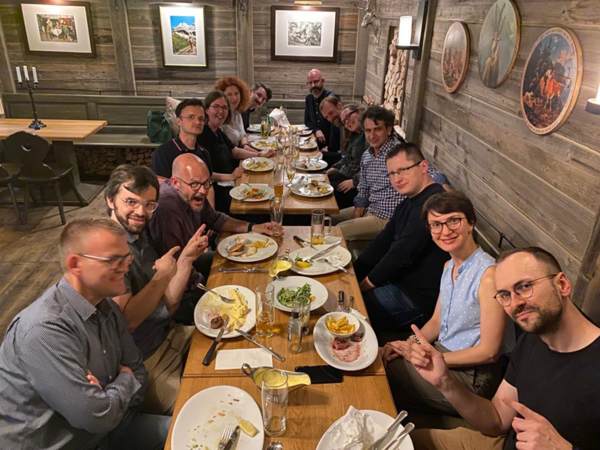ENDURE: Inequalities, Community Resilience and New Governance Modalities in a Post-Pandemic World
Marina Fontolan (on behalf of the ENDURE team)July 3, 2023 | Projects
The ENDURE: Inequalities, Community Resilience and New Governance Modalities in a Post-Pandemic World project began in summer 2022. It examines the short- and long-term consequences of Covid-19 from a comparative perspective. It studies the pandemic holistically, as a new source for mobilization of societies and political systems, and examines (de-)mobilization of communities, and how this has ushered in a new era of change and transformation. The research combines cutting-edge methodologies that draw on historical, sociological, political science, media studies, and cultural research. This project is guided by four main objectives:
- Identify how inequalities in their various dimensions (such as ethnicity, class, migratory status, gender, and age) have been reinforced and challenged, and map how new forms of (de-)mobilization evolved during and after the pandemic.
- Analyze Covid-19’s governance at local, national, and global levels from a comparative perspective, and explore the societal, political, and ethical consequences of these governance practices on social inequalities, on political systems, people’s rights, and freedoms as well as in the context of the increasing divide between Global North and South.
- Understand community resilience practices through the study of grassroots solidarity movements and the mobilization of social groups and communities to generate social and political collective action.
- Analyze the sources and promotion of dis and mis-information in social and mainstream media and to assess social media’s empowering and repressive roles in the context of Covid-19.
Cluster 1 – Governance in times of crisis: (De-)Mobilization of Locked down and Vaccinated Publics
This cluster focuses on governance practices in the case of Covid-19 crisis, investigating the pandemic control. In it, we are exploring different governance strategies among the countries. We are comparing these strategies with government types, and exploring the relationship between academic knowledge production and governance, assessing the impact of those governance strategies in each country involved in the project.
Cluster 2 – Challenging Inequalities in the Post-Covid World: Mobilization, Agency and Belonging
The Covid-19 crisis prompted the worldwide reconfiguration of inequalities. While it reinforced existing parameters of ethnicity, class, migratory status, gender and age, it also overlaid these injustices with new dimensions of inequality concerning health, safety, mobility, education, vaccination access, and interpersonal and communal violence. We are conducting interviews with several underrepresented groups (from essential workers - such as teachers and delivery workers - to traditional communities - such as quilombos and migrant communities) to learn more about their survival strategies. The current research state shows that the communities adopted different strategies, which can mostly be categorized as individual or collective strategies. We are currently investigating how they impacted on the person’s view of the pandemic and the results of them for the community as a whole.
Cluster 3 – Public Attitudes and Resilience After Crisis Events: Assessing (Il-)liberal Values and Social Stress
This cluster investigates populist, nationalist and authoritarian attitudes during the Covid-19 crisis. It comprises a survey experiment that compares the separate causal effects of inequality, immigration, and perceptions of how the pandemic was managed by governments on populist, nationalist and illiberal values within national populations. The survey was already developed and tested, and we will fully conduct it in the upcoming months.
Cluster 4 – Mobilising (d/mis)information and communities: Governance Rhetoric, Polarization and Empathy
Social media has played an important role in the Covid-19 crisis on transnational, national and local levels, in both top-down and bottom-up communication. It has enabled bonding and empowerment but also the spread of polarizing and confrontational rhetoric. We are gathering Twitter data using a software called MeCodify and using topic modeling to analyze the data. Considering the different reality of each country, we decided to focus on six main topics: the virus, masking policies, authorities (related to government and health), lockdowns, vaccinations, and the first post-pandemic elections. These topics enable us to compare and understand how disinformation circulated in different countries.
Cluster 5 – Innovation Mode: Interdisciplinary Knowledge synthesis of ENDURE
This cluster posits that a harmonized paradigm and theory of resilience – applied through various contexts and responses generated by the other workplans – is required to address the many challenges that global society is currently facing in the context of a global disaster like Covid-19.

Part of the ENDURE Project Team after the project kick-off meeting on June 1, 2022 [Image source: ENDURE website]
As part of this project, we are also organizing the 4S 2023 panel “Social aspects of the Covid-19 crisis: Inequalities, Resiliences, and Knowledge Production”. We hope that the panel contributors furthers our understanding of the Covid-19 pandemic in other countries and develop new partnerships for this ongoing project. ENDURE is funded by the Trans-Atlantic Platform for Social Sciences and Humanities (T-AP) program. For more information about the project, access our website: https://www.endure-project.org/
Marina Fontolan is the ENDURE team’s postdoc researcher at the department of Science and Technology Policy, University of Campinas (Unicamp), Brazil with a grant from São Paulo Research Foundation (FAPESP - Process Nº: 2022/07655-1).
Published: 07/03/2023
